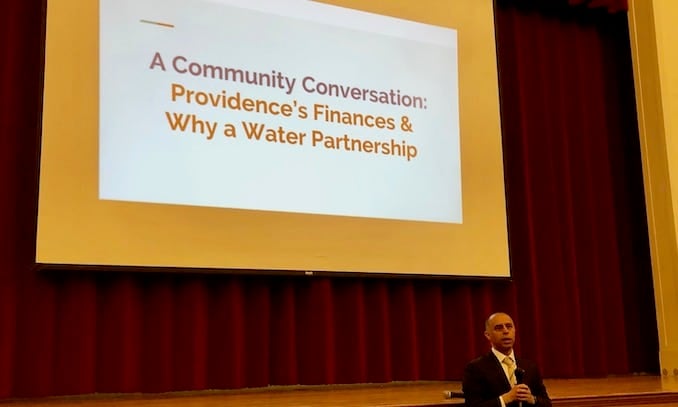Mayor Elorza’s third Community Conversation about monetizing Providence Water
“Why are you willing to put the water supply of the entire state at risk with climate change coming?” asked Providence resident Margaret O’Donnell. “Water is going to be so scarce that we’re going to be killing each other for it… They tell us we only have 12 years left and you’re sitting here at the start of this catastrophe
March 26, 2019, 1:25 pm
By Steve Ahlquist
“Why are you willing to put the water supply of the entire state at risk with climate change coming?” asked Providence resident Margaret O’Donnell. “Water is going to be so scarce that we’re going to be killing each other for it… They tell us we only have 12 years left and you’re sitting here at the start of this catastrophe selling off our water supply because we have a pension problem?”
Providence Mayor Jorge Elorza held the second of three scheduled Community Conversations on his idea to “monetize” Providence Water, that is, to enter into a public-private partnership with a large company that will pay the City for the rights to manage and profit from the Providence Water system. (See coverage of the first and second Community Conversations here and here.)
Around 100 members of the public were in attendance at Nathan Bishop Middle School on the East Side of Providence. Attending were Providence City Councilors Helen Anthony (Ward 2) and Nirva LaFortune (Ward 3) and State Representatives Edith Ajello (Democrat, District 1, Providence) and Rebecca Kislak (Democrat, District 4, Providence). Former Providence City Councilor Samuel Zurier (Ward 2) was also in attendance. Present also were activists from Water Is Life – Land & Water Sovereignty Campaign, a group established to protect water in Rhode Island from corporate despoliation.
Elorza has linked the issue of a pending pension crisis to monetizing the water. As they had during the first two meetings, members of Elorza’s administration, Finance Director Larry Mancini, Director of Sustainability Leah Bamberger, City Solicitor Jeffrey Dana and Chief of Staff Nicole Pollock, spent some time answering questions about the scope and depth of the City’s unfunded pension. If nothing is done to address the pension system, which has gone underfunded for decades, Providence will be forced to raise taxes, make draconian cuts to City services, and may face bankruptcy, said administration officials.
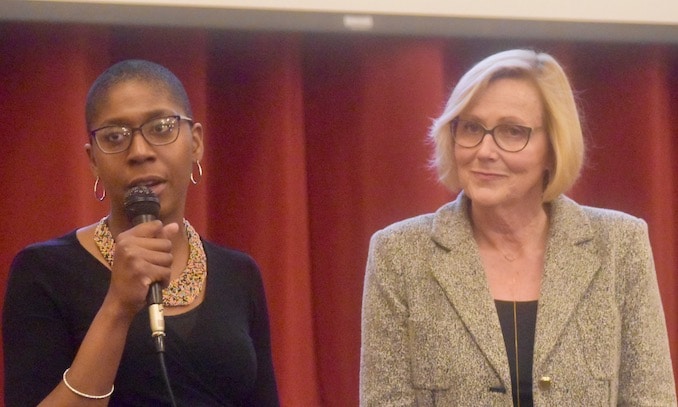
The meeting began with introductions from City Councilors Anthony and LaFortune. Representative Kislak also provided some words.
“It’s very very important, I think, for the residents of our City to understand exactly what the finances are and the urgency of this issue,” said Anthony, then turning her attention to the protesters in the room, Anthony said, “I know there are a lot of people opposed to the privatization, which is not what they’re planning, of the Providence Water Supply … but we just don’t want anybody shouting over each other…” This was a clear reference to the last meeting, where protesters interrupted the question and answer portion of the program.
“The decision that will be made should include the community,” said LaFortune. “Hopefully all this information can help this administration move forward in making the best decision to not only prioritize the financial situation of the City … but also to make sure that we are also prioritizing our water…”
“I’m hoping that we can all listen to this conversation and also widen the conversation … Our City finances … we need to do better, we need to shore them up and we need to have a City/State partnership to make that happen…” said Kislak.
“Councilman Sam Zurier… has been a leading voice on this for a while and he, in his role on the City Council led a committee to also study this issue, so there’s a wealth of knowledge there,” said Elorza. The Mayor mentioned that the idea to monetize the water came out of a report his administration commissioned from the National Resource Network when he first took office. You can access the report here. The recommendation to “monetize” the water is on pages 81-84.
Chief of Staff Nicole Pollock presented the half hour slide presentation, as she had during the last Community Conversation. Several of the issues raised in previous meetings and answered by Finance Director Mancini were incorporated into her latest presentation.
There were then a series of questions and comments from those in attendance. The first question concerned the Narragansett Bay Commission, which has expressed interest in acquiring Providence Water, not leasing it.
A question on lead line replacement. Providence Water has very low levels of lead, until it gets to some of the houses in Providence, which have lead lined pipes connecting the home to the main water line. Replacing this piping is very expensive, and the costs are mostly borne by the homeowner.
A question about the enforcement measures being considered, were the City enter into a lease with a private company. “I think that what you’re saying assumes that these [private management companies] are good actors. They are not good actors. They have shown repeatedly, over and over and over again that they are not to be trusted… What ends up using a lot of resources is fighting with them, and I want to know how my family gets made whole when they screw it up?”
“How did you arrive at the $400 million value for the water?”
When a woman asked those attending to raise there hands in order to gauge the “temperature of the room” as regards the plan to lease the water, the vast majority in attendance were opposed to the plan. Maybe five were for the idea, and a smattering of people were undecided.
Of interest was that two of the people who raised their hands in support of the plan to lease the water were former Ward 2 City Councilor Sam Zurier and Attorney Seth Handy, who is known as an environmental lawyer despite having worked hard at the General Assembly to push through a bill that would allow the burning of biomass to generate electricity last year. (See item 1a here and this piece.)
Seth Handy is Councilor Helen Anthony’s law partner. (See item 2c here.)
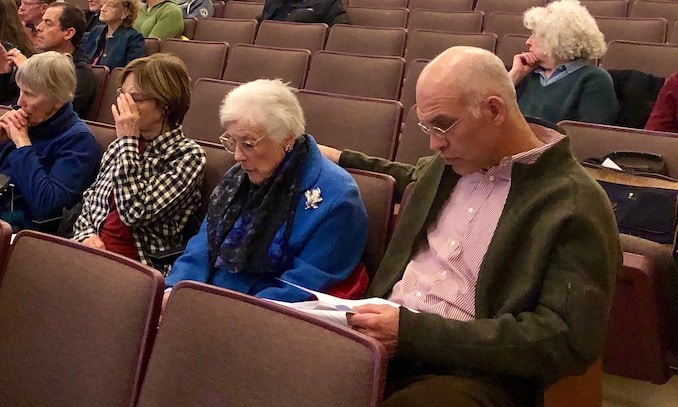

“What I hear you saying is that ‘We are different. Providence is special,'” said the woman. “What makes you think we are special? We are a City of people who care, just like everywhere else. What makes you think that all of these problems that you read about in the news are not going to happen to us?”
A question about the enabling legislation submitted to the General Assembly. This legislation, if passed, will allow the City to enter into a deal to lease the Water.
Providence resident Mark Binder made several suggestions regarding the City’s finances. He suggested eliminating the rainy day fund to pay down the pension debt. He suggested doing the work of raising taxes that are not on citizens, even though they are hard to get the State legislature to approve them. He suggested working on a way to allow Providence to make money from the water without selling or leasing the asset. He suggested creating a Providence based entity that would be owned by Providence and then sell the water to itself to again, make money on the sale of the water.
Mayor Elorza decided to address Binder’s ideas himself. “That is something we have explored and we’re interested in exploring,” said Elorza.
Elorza acknowledged that trying to do such a plan means “Squarely having to address the question of who is entitled to that additional revenue,” the City or the ratepayers.
“This won’t happen if we don not get buy in [from the State] and we do not have the authority to do it,” said Pollock.
“When you talk about doing anything to our access to clean drinking water, that rightfully creates a lot of anxiety because the loss of a clean drinking water source would be devastating. The problem, the biggest hole that I see in your calculation is that no matter how many regulatory systems you put into place to prevent the kind of horrible things that could happen that everyone here is afraid of, no regulatory system has any teeth without the resources to enforce it…”
Daniel Crowell wrote this piece on Uprise RI last week, suggesting that the non-profit educational entities such as Brown University pay their fair share in taxes, instead of leasing Providence Water. He suggested this at the meeting:
“You said that the Scituate Reservoir and the Providence Water Supply Board is only valued at $400 million,” said Margaret O’Donnell. “It cost $21 million to produce the reservoir a hundred years ago… If you convert that money, to current dollars, it’s over half a trillion dollars…
“You’re actually putting our water supply at risk to a for-profit corporation which we know from years and years and years of watching for-profit corporations destroy infrastructure… So why do you think they’re going behave any differently than they ever have?
“Why are you willing to put the water supply of the entire state at risk with climate change coming? Water is going to be so scarce that we’re going to be killing each other for it… They tell us we only have 12 years left and you’re sitting here at the start of this catastrophe selling off our water supply because we have a pension problem? I’m not even sure we’re going to be alive to address that pension problem.
“I really object to your going right for the water supply. That is the easy solution. Because it’s easy for you to sell the water supply. But it’s not easy to go after the colleges. It’s not easy to go after the one percent and make them pay an income tax…
“It’s not going to be great. It’s not going to be great.”
A man who was a public employee in Massachusetts in the 1960’s noted that Governor Michael Dukakis did not go after the water supply when he dealt with a pension crisis. “He treated it as a pension liability problem.”
A man with experience in tech startups noted that the $400 million evaluation might not be accurate. Capitalist look at revenue, and since the revenue of the Providence Water system is only about $10 million, the evaluation he said that the system is truly only worth $36 million to a leasing company.
“A private corporation is only responsible to its shareholders. The PUC is appointed by the Governor, so the PUC members are not democratically elected by the residents of Providence. So we’re going to be in a situation where there’s no accountability…”
In the interests of time, the administration decided to take the remaining questions all at once, and answer them all at the end. This strategy was not very successful:
How can we support the process of establishing a regional water board, answerable to democracy?
A regional water board would act as a non-profit. It would protect the water system from bankruptcy were Providence to go bankrupt.
“I think you should have more than three of these public presentations,” said environmental activist Lorraine Savard. “You have troll companies searching for cities like Providence who need the cash. You need to be concerned about them.”
“I said when John Lombardi suggested selling Providence Water I would fight to the death… What companies have you found that have been doing good partnerships with cities?”
Echoing what the man with tech experience said earlier, Greg Gerritt said, “I don’t think the numbers add up.”
“What is the average age of the pensioners you are dealing with?”
“Years ago the City decided that it would make more sense for private companies to handle things like the street lights,” said Katherine Ahlquist (full disclosure she is married to this author.) “Just recently, we realized that it’s actually cheaper for us to pay for our own electricity for those streetlights because we had the power to say what kind of lightbulbs we could use and cut down the amount of money we pay to the utility…
“…taking something as essential as water … and selling it off for a one time fix … is irresponsible.”
James Rowley from Conservation Law Foundation (CLF) brought up some concerns about the potential leasing deal. These concerns include the temporary removal of oversight by the PUC, the ownership stake of the ratepayer, development of land around the Scituate Reservoir. “We are concerned that a buyer will see development o the land around the reservoir as an opportunity to profit off the investment.”
“The regulatory aspect is very important… How would you oversee the chemicals and materials that are used for the water treatment?” A company that’s cutting costs for these materials and chemicals might use stronger and cheaper ammonia, for instance. “Those stronger cheaper ammonias are what dissolves lead in our old pipes…”
“I have two observations to make,” said Mikaila Arthur. Arthur’s first observation concerned how money get made in this process. By cutting costs in ways that make the water less safe, increasing rates becomes a regressive tax on the poorest, instead of a progressive tax on the richest, and finally, economies of scale usually occur through cutting staff, something that the administration says will not be allowed.
Arthur’s second observation was that if something were to go wrong with the deal, Providence would have to get out of the contract by giving the money is made back to the company (and spend hefty legal fees as well, I should add.)
“I do want to say absolutely not. I do not agree with this one bit. I think that you are asking us to support enabling legislation without us having any idea what the terms will be…
“The risk for us is very high. We don’t know, if we enable this legislation… if this administration is going to be around to make the deal. It could be a whole ‘nother administration by the time a deal like this came around…”
Note that Elorza is presently term limited, and can only finish out his current four year term.
“Three days. That’s the amount of time that a person can live without a clean water source… You’re asking us to buy into a promise that you’re going to do better than what the other states have done – a promise that you’re going to have controls in place, a promise that you’re going to enforce…”
A different plan. Instead of selling off to the corporations and giving control of our assets to the one percent, we need “disengagement from these elites…
“What about a public bank? … What about the Green Economy?”
“We have to move towards strengthening our public control, not lessening it. A 30 or 50 year lease really gives up control. We don’t want to do that…”
“I find it strange that you’re talking about this but you don’t have an idea of how you’re going to negotiate it…”
More on the lead line replacement issue.
A long list of issues about Providence Water, included the new, very expensive headquarters and its billing system.
A request for more public forums that include members of the Providence Water Supply Board and the Providence Water management team.
The administration wrapped up by trying to group and answer the questions asked and comments made. They were somewhat successful in doing so.
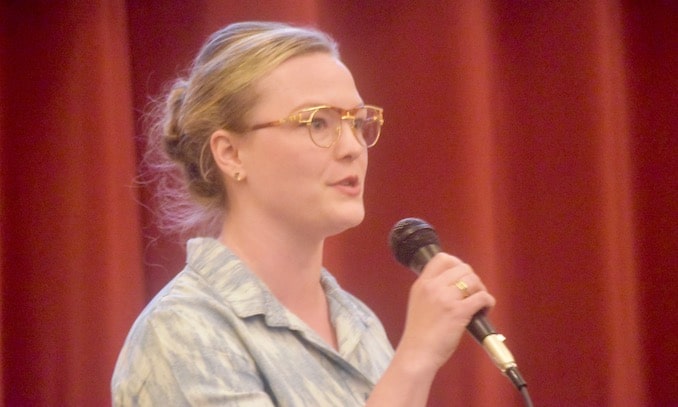
Nicole Pollock 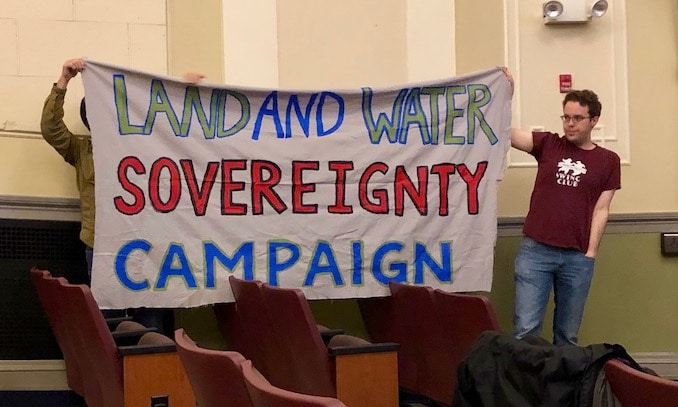
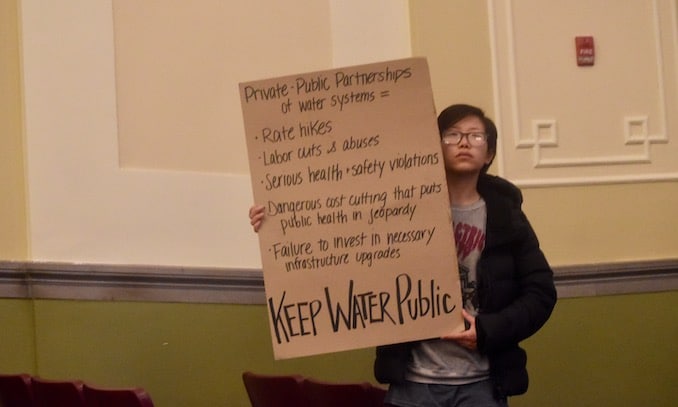
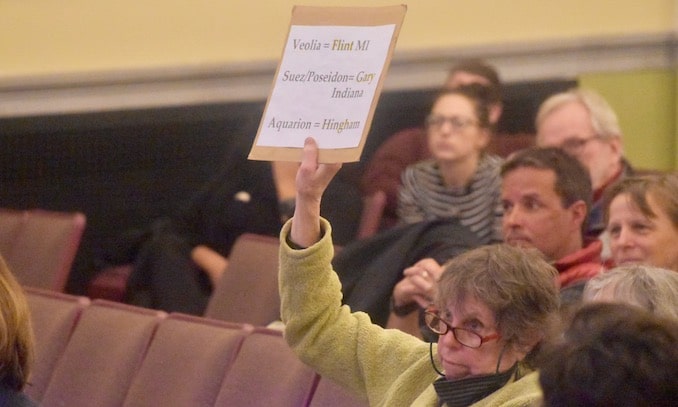
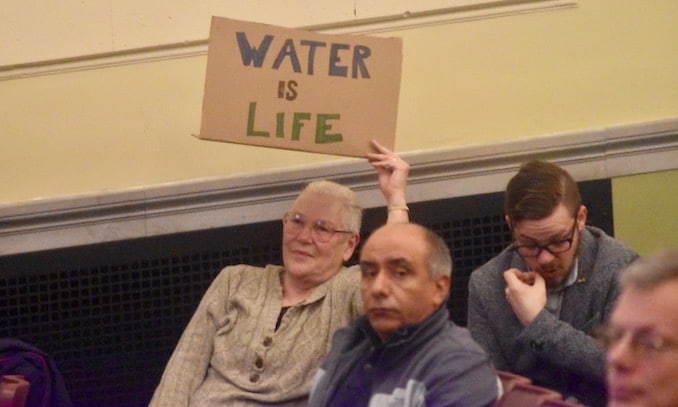
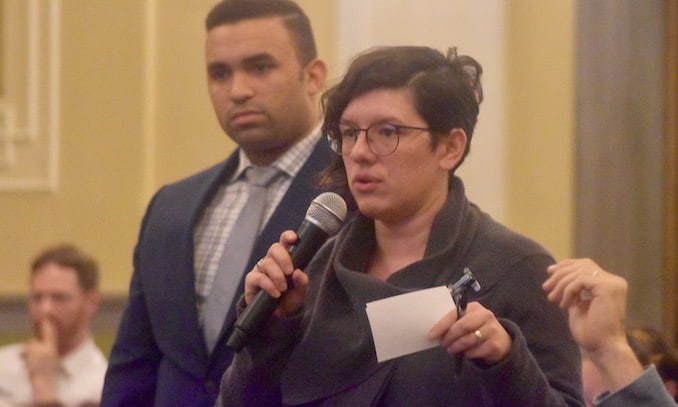
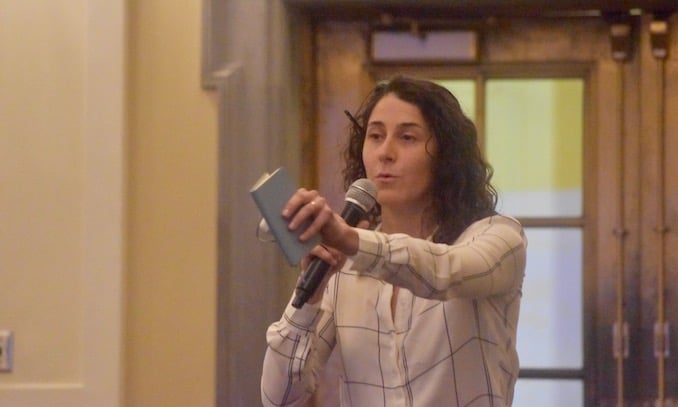
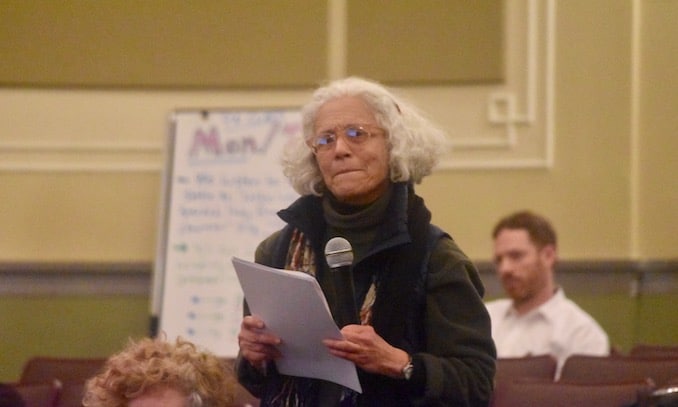
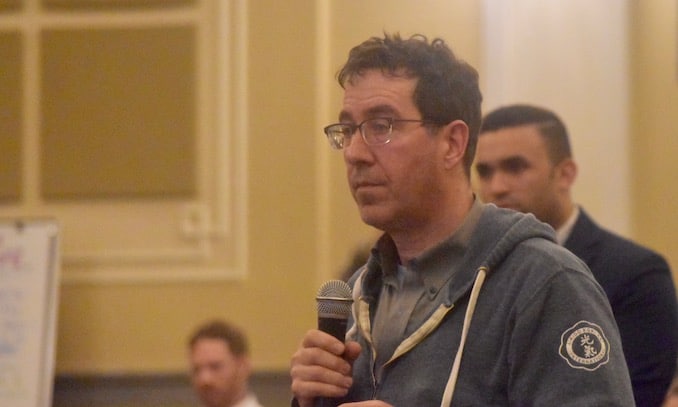
Mark Binder 
Daniel Crowell 
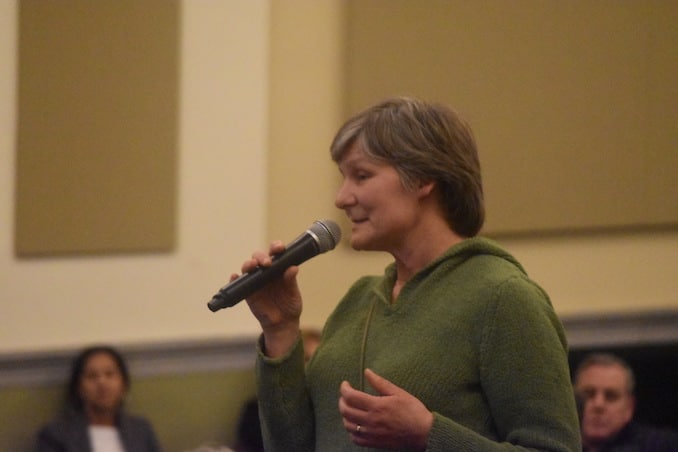
Katherine Ahlquist 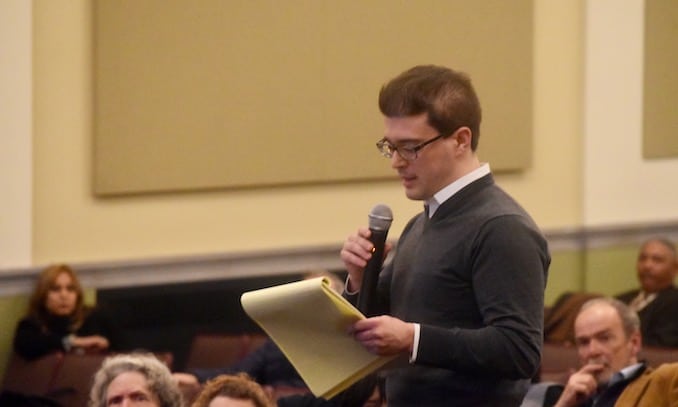
James Rowley
Uprise RI is entirely supported by donations and advertising. Every little bit helps:
Become a Patron!



